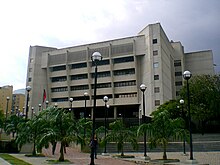
Back Tribunal Supremo de Justicia de Venezuela Spanish دادگاه عالی ونزوئلا Persian Tribunal suprême de justice French Tribunale supremo di giustizia (Venezuela) Italian Tribunal Supremo de Justiça (Venezuela) Portuguese Vrhovni sud pravde (Venezuela) Serbo-Croatian 委內瑞拉最高法院 Chinese
This article has multiple issues. Please help improve it or discuss these issues on the talk page. (Learn how and when to remove these messages)
|
| Supreme Justice Tribunal | |
|---|---|
| Tribunal Supremo de Justicia | |
 | |
 TSJ building in Caracas | |
| Established | 1999 |
| Jurisdiction | Venezuela |
| Location | Caracas |
| Authorised by | Constitution of Venezuela |
| Website | Official website |
| President | |
| Currently | Caryslia Rodríguez |
| Since | 17 January 2024 |
 |
|---|
|
|
The Supreme Justice Tribunal (Spanish: Tribunal Supremo de Justicia or TSJ) is the highest court of law in the Bolivarian Republic of Venezuela and is the head of the judicial branch. As the independence of the Venezuelan judiciary under the regime of Nicolás Maduro is questioned, there have recently been many disputes as to whether this court is legitimate.
The Supreme Tribunal may meet either in specialized chambers (of which there are six: constitutional, political/administrative, electoral, civil, criminal, and social) or in plenary session. Each chamber has five judges, except the constitutional, which has seven. Its main function is to control, according to the constitution and related laws, the constitutionality and legality of public acts.
The Supreme Tribunal's 32 magistrates (magistrados) are appointed by the National Assembly and serve non-renewable 12-year terms. Appointments are made by a two-thirds majority, or a simple majority if efforts to appoint a judge fail three times in a row. Under article 265 of the 1999 Constitution, judges may be removed by a two-thirds majority of the National Assembly, if the Attorney General, Comptroller General, and Human Rights Ombudsperson have previously agreed to a "serious failure" and suspended the judge accordingly.
- ^ "Senado chileno reconoce al TSJ en el exilio como autoridad legítima de Venezuela". Diario Las Américas (in Spanish). Retrieved 2018-07-12.
- ^ "Parlamento chileno aprueba proyecto que reconoce la legitimidad del TSJ venezolano en el exilio". La Patilla (in European Spanish). 2018-10-04. Retrieved 2018-10-05.